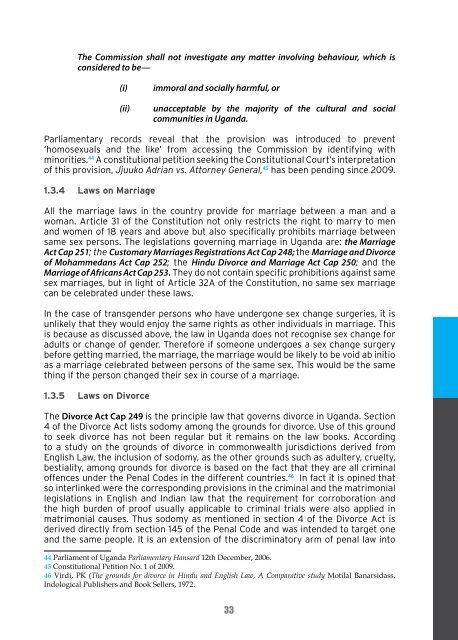PERSONS IN UGANDA
4Tks5WfQb
4Tks5WfQb
You also want an ePaper? Increase the reach of your titles
YUMPU automatically turns print PDFs into web optimized ePapers that Google loves.
The Commission shall not investigate any matter involving behaviour, which is<br />
considered to be—<br />
(i)<br />
(ii)<br />
immoral and socially harmful, or<br />
unacceptable by the majority of the cultural and social<br />
communities in Uganda.<br />
Parliamentary records reveal that the provision was introduced to prevent<br />
‘homosexuals and the like’ from accessing the Commission by identifying with<br />
minorities. 44 A constitutional petition seeking the Constitutional Court’s interpretation<br />
of this provision, Jjuuko Adrian vs. Attorney General, 45 has been pending since 2009.<br />
1.3.4 Laws on Marriage<br />
All the marriage laws in the country provide for marriage between a man and a<br />
woman. Article 31 of the Constitution not only restricts the right to marry to men<br />
and women of 18 years and above but also specifically prohibits marriage between<br />
same sex persons. The legislations governing marriage in Uganda are: the Marriage<br />
Act Cap 251; the Customary Marriages Registrations Act Cap 248; the Marriage and Divorce<br />
of Mohammedans Act Cap 252; the Hindu Divorce and Marriage Act Cap 250; and the<br />
Marriage of Africans Act Cap 253. They do not contain specific prohibitions against same<br />
sex marriages, but in light of Article 32A of the Constitution, no same sex marriage<br />
can be celebrated under these laws.<br />
In the case of transgender persons who have undergone sex change surgeries, it is<br />
unlikely that they would enjoy the same rights as other individuals in marriage. This<br />
is because as discussed above, the law in Uganda does not recognise sex change for<br />
adults or change of gender. Therefore if someone undergoes a sex change surgery<br />
before getting married, the marriage, the marriage would be likely to be void ab initio<br />
as a marriage celebrated between persons of the same sex. This would be the same<br />
thing if the person changed their sex in course of a marriage.<br />
1.3.5 Laws on Divorce<br />
The Divorce Act Cap 249 is the principle law that governs divorce in Uganda. Section<br />
4 of the Divorce Act lists sodomy among the grounds for divorce. Use of this ground<br />
to seek divorce has not been regular but it remains on the law books. According<br />
to a study on the grounds of divorce in commonwealth jurisdictions derived from<br />
English Law, the inclusion of sodomy, as the other grounds such as adultery, cruelty,<br />
bestiality, among grounds for divorce is based on the fact that they are all criminal<br />
offences under the Penal Codes in the different countries. 46 In fact it is opined that<br />
so interlinked were the corresponding provisions in the criminal and the matrimonial<br />
legislations in English and Indian law that the requirement for corroboration and<br />
the high burden of proof usually applicable to criminal trials were also applied in<br />
matrimonial causes. Thus sodomy as mentioned in section 4 of the Divorce Act is<br />
derived directly from section 145 of the Penal Code and was intended to target one<br />
and the same people. It is an extension of the discriminatory arm of penal law into<br />
44 Parliament of Uganda Parliamentary Hansard 12th December, 2006.<br />
45 Constitutional Petition No. 1 of 2009.<br />
46 Virdi, PK (The grounds for divorce in Hindu and English Law, A Comparative study Motilal Banarsidass,<br />
Indological Publishers and Book Sellers, 1972.<br />
33


